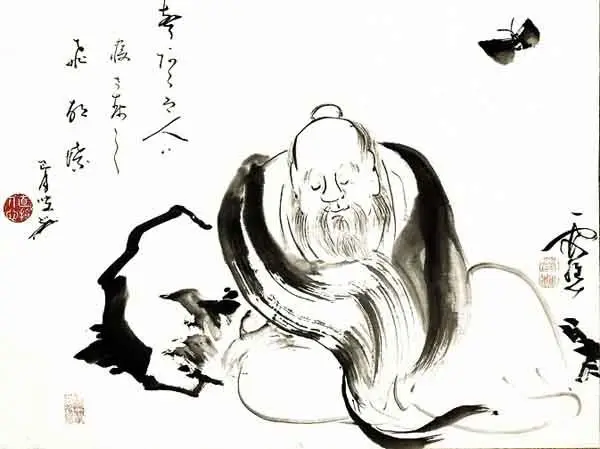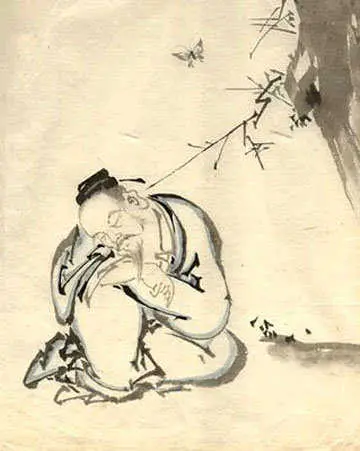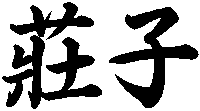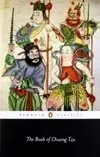|
Tao Te Ching
THE TAOISM OF LAO TZU
|
Chuang Tzu 30 The Taoist Text, Chapter 30
Delight in the Sword-fight.Formerly, king Wan of Kâo delighted in the sword-fight. More than three thousand men, masters of the weapon, appeared as his guests, lining the way on either side of his gate, and fighting together before him day and night. Over a hundred of them would die or be (severely) wounded in the course of a year, but he was never weary of looking on (at their engagements), so fond was he of them. The thing continued for three years, when the kingdom began to decay, and other states to plan measures against it.
The crown-prince Khwei was distressed, and laid the case before his attendants, saying, "If any one can persuade the king, and put an end to these swordsmen, I will give him a thousand ounces of silver." His attendants said, "(Only) Kwang-tsze is able to do this." Thereupon the prince sent men with a thousand ounces of silver to offer to Kwang-tsze, who, however, would not accept them, but went with the messengers. When he saw the prince, he said, "0 prince, what have you to say to Kâu, and why would you give me the silver?" The prince replied, "I have heard that you, master, are sagacious and sage. I sent you respectfully the thousand ounces of silver, as a prelude to the silks and other gifts. But as you decline to receive them, how dare I now tell you (what I wished from you)?" Kwang-tsze rejoined, "I have heard, 0 prince, that what you wanted me for was to wean the king from what is his delight. Suppose that in trying to persuade his Majesty I should offend him, and not fulfil your expectation, I shall be punished with death; and could I then enjoy this silver? Or suppose that I shall succeed in persuading his Majesty, and accomplish what you desire, what is there in the kingdom of Kâo that I might ask for which I would not get?" The crown-prince said, "Yes; but my (father), the king, will see none but swordsmen." Kwang-tsze replied, "I know; but I am expert in the use of the sword." "That is well," observed the prince; "but the swordsmen whom his Majesty sees all have their hair in a tangle, with whiskers projecting out. They wear slouching caps with coarse and unornamented tassels, and their coats are cut short behind. They have staring eyes, and talk about the hazards of their game. The king is delighted with all this; but now you are sure to present yourself to him in your scholar's dress, and this will stand greatly in the way of your success." Kwang-tsze said, "I will then, with your leave, get me a swordsman's dress." This was ready in three days, and when he appeared in it before the prince, the latter went with him to introduce him to the king, who then drew his sword from its scabbard and waited for him. When Kwang-tsze entered the door of the hall, he did not hurry forward, nor, when he saw the king, did he bow. The king asked him, "What do you want to teach me, Sir, that you have got the prince to mention you beforehand?" The reply was, "I have heard that your Majesty is fond of the sword-fight, and therefore I have sought an interview with you on the ground of (my skill in the use of) the sword." "What can you do with your sword against an opponent?" "Let me meet with an opponent every ten paces, my sword would deal with him, so that I should not be stopped in a march of a thousand lì." The king was delighted with him, and said, "You have not your match in the kingdom." Kwang-tsze replied, "A good swordsman first makes a feint (against his opponent), then seems to give him an advantage, and finally gives his thrust, reaching him before he can return the blow. I should like to have an opportunity to show you my skill." The king said, "Stop (for a little), Master. Go to your lodging, and wait for my orders. I will make arrangements for the play, and then call you." The king accordingly made trial of his swordsmen for seven days, till more than sixty of them were killed, or (severely) wounded. He then selected five or six men, and made them bring their swords and take their places beneath the hall, after which he called Kwang-tsze, and said to him, "To-day I am going to make (you and) these men show what you can do with your swords." "I have long been looking for the opportunity," replied Kwang-tsze. The king then asked him what would be the length of the sword which he would use; and he said, "Any length will suit me, but I have three swords, any one of which I will use, as may please your Majesty. Let me first tell you of them, and then go to the arena." "I should like to hear about the three swords," said the king; and Kwang-tsze went on, "There is the sword of the Son of Heaven; the sword of a feudal prince; and the sword of a common man." "What about the sword of the Son of Heaven?" "This sword has Yen-khì and Shih-khang for its point; Khì and (Mount) Tâi for its edge; Tsin and Wei for its back; Kâu and Sung for its hilt; Han and Wei for its sheath. It is embraced by the wild tribes all around; it is wrapped up in the four seasons; it is bound round by the Sea of Po; and its girdle is the enduring hills. It is regulated by the five elements; its wielding is by means of Punish ments and Kindness; its unsheathing is like that of the Yin and Yang; it is held fast in the spring and summer; it is put in action in the autumn and winter. When it is thrust forward, there is nothing in front of it; when lifted up, there is nothing above it; when laid down, there is nothing below it; when wheeled round, there is nothing left on any side of it; above, it cleaves the floating clouds; and below, it penetrates to every division of the earth. Let this sword be once used, and the princes are all reformed, and the whole kingdom submits. This is the sword of the Son of Heaven." King Wan looked lost in amazement, and said again, "And what about the sword of a feudal lord?" (Kwang-tsze) replied, "This sword has wise and brave officers for its point; pure and disinterested officers for its edge; able and honourable officers for its back; loyal and sage officers for its hilt; valiant and eminent officers for its sheath. When this sword is thrust directly forward, as in the former case, there is nothing in front of it; when directed upwards, there is nothing above it; when laid down, there is nothing below it; when wheeled round, there is nothing on any side of it. Above, its law is taken from the round heaven, and is in accordance with the three luminaries; below, its law is taken from the square earth, and is in accordance with the four seasons; between, it is in harmony with the minds of the people, and in all the parts of the state there is peace. Let this sword be once used, and you seem to hear the crash of the thunder-peal. Within the four borders there are none who do not respectfully submit, and obey the orders of the ruler. This is the sword of the feudal lord." "And what about the sword of the common man?" asked the king (once more). (Kwang-tsze) replied, "The sword of the common man (is wielded by) those who have their hair in a tangle, with whiskers projecting out; who wear slouching caps with coarse and unornamented tassels, and have their coats cut short behind; who have staring eyes, and talk (only) about the hazards (of their game). They hit at one another before you. Above, the sword slashes through the neck; and below, it scoops out the liver and lungs. This is the sword of the common man. (The users of it) are not different from fighting cocks; any morning their lives are brought to an end; they are of no use in the affairs of the state. Your Majesty occupies the seat of the Son of Heaven, and that you should be so fond of the swordsmanship of such common men, is unworthy, as I venture to think, of your Majesty."
On this the king drew Kwang-tsze with him, and went up to the top of the hall, where the cook set forth a meal, which the king walked round three times (unable to sit down to it). Kwang-tsze said to him, "Sit down quietly, Great King, and calm yourself. I have said all I wished to say about swords." King Wan, thereafter, did not quit the palace for three months, and the swordsmen all killed themselves in their own rooms. 
Chuang Tzu
 The Book of Chuang TzuA modern translation of Chuang Tzu, by Martin Palmer and Elizabeth Breuilly.See the book at Amazon
About CookiesMy Other Websites:I Ching OnlineThe 64 hexagrams of the Chinese classic I Ching and what they mean in divination. Try it online for free.
Qi Energy ExercisesThe ancient Chinese life energy qi (chi) explained, with simple instructions on how to exercise it.
Life EnergyThe many ancient and modern life force beliefs all over the world explained and compared.
Taoismen på svenska
Other Books by Stefan StenuddClick the image to see the book at Amazon (paid link).
The Greek philosophers and what they thought about cosmology, myth, and the gods. |
 Tao Te Ching
Tao Te Ching Tao Quotes
Tao Quotes Fake Lao Tzu Quotes
Fake Lao Tzu Quotes Cosmos of the Ancients
Cosmos of the Ancients Qi — Increase Your Life Energy
Qi — Increase Your Life Energy Aikido Principles
Aikido Principles Life Energy Encyclopedia
Life Energy Encyclopedia Archetypes of Mythology
Archetypes of Mythology Stefan Stenudd
Stefan Stenudd